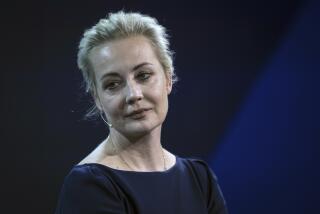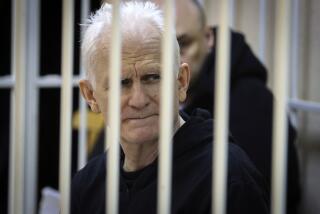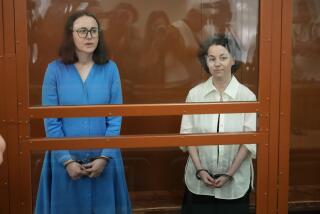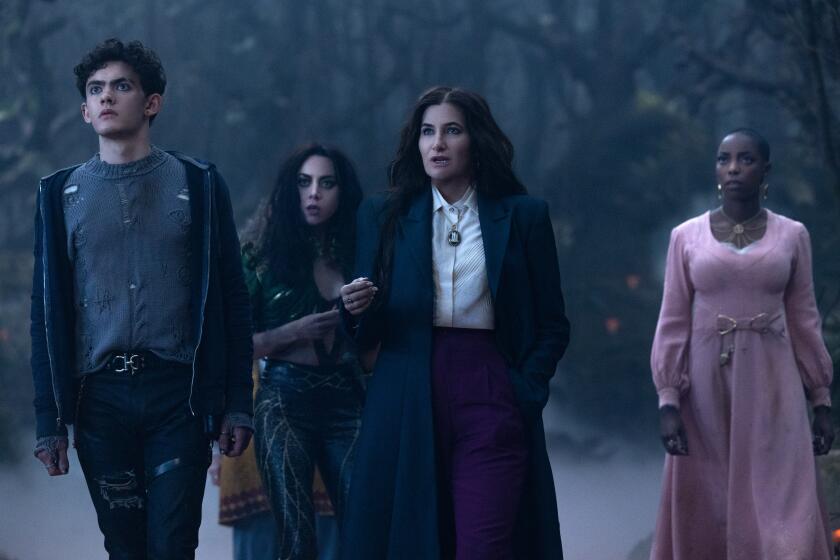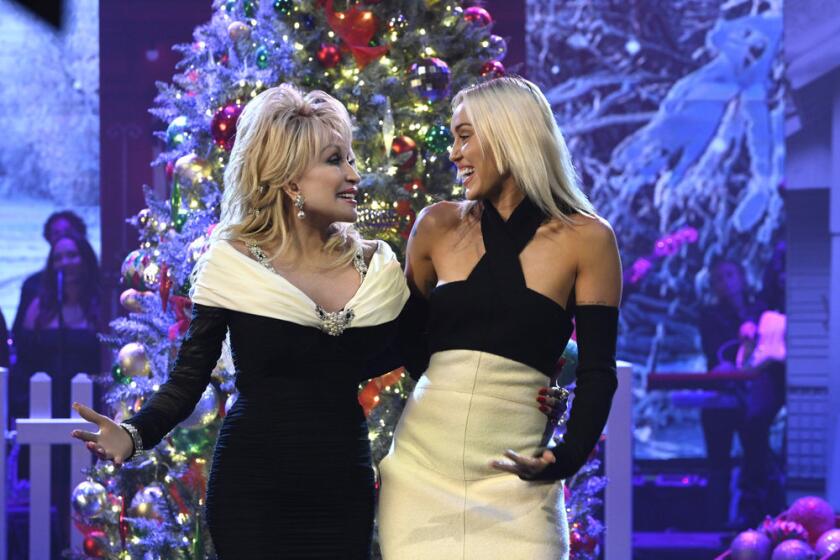Is maestro Valery Gergiev being scapegoated for Russia’s anti-gay laws?
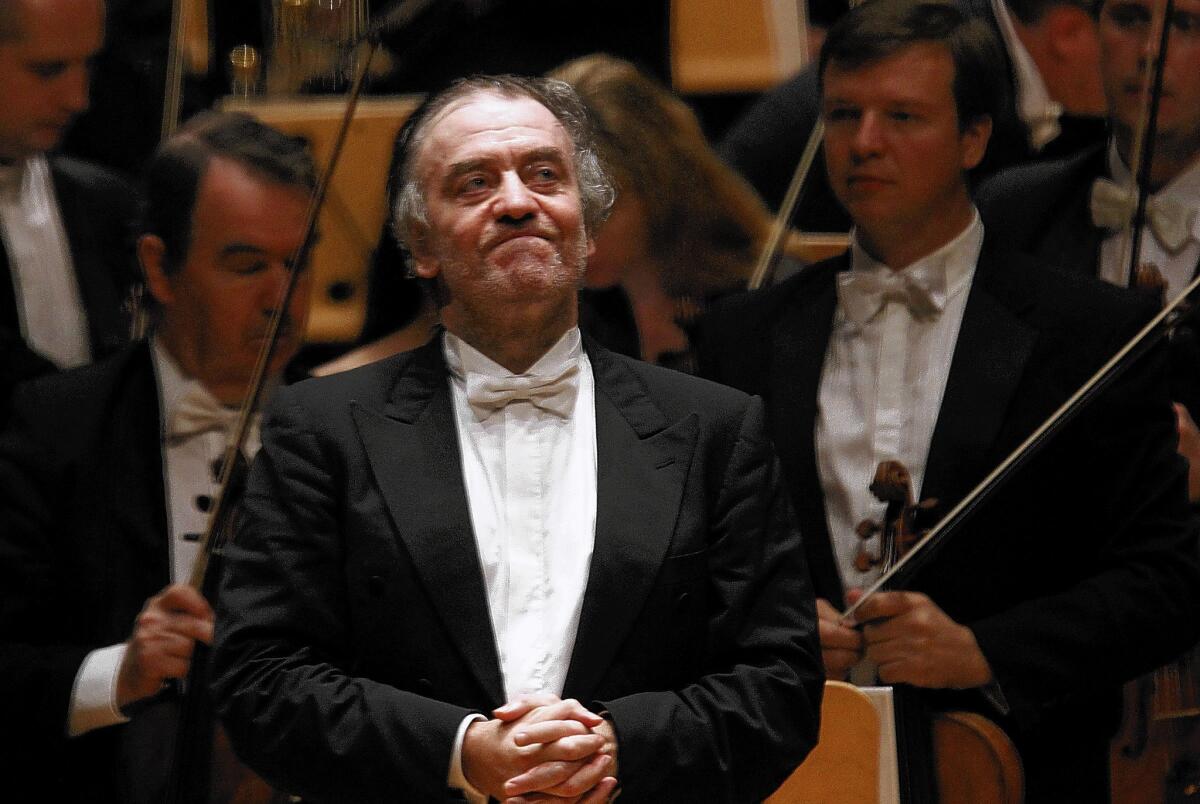
Valery Gergiev is the major conductor today for whom the most superlatives apply.
He is commonly hailed as Russia’s greatest living conductor. As the general and artistic director of the Mariinsky Theatre in St. Petersburg — which includes Russia’s leading opera and ballet companies and symphony orchestra — he is his country’s most powerful, prominent, celebrated, decorated and highly paid musician.
He is also the cultural figure with the closest ties to the Kremlin. Gergiev and President Vladimir V. Putin are longtime friends. On May Day, the president pinned the newly restored Lenin medal, Hero of Labor, on Gergiev’s chest. Gergiev has also been made international ambassador for the 2014 Winter Olympics in Sochi.
GRAPHIC: Best of 2013 | Entertainment and culture
That relationship has led to a further superlative. Gergiev has become the world’s most controversial conductor, protested against nearly everywhere he appears outside of Russia. This is because he has not taken a firm vocal stand against the Putin-backed anti-gay legislation, which bans “propaganda of nontraditional sexual relations.”
Gergiev has been reticent other than to say that he is an artist, not a politician, that he wouldn’t permit discrimination of any sort at the Mariinsky and that he is too busy to wade through a long law’s obtuse legalese.
During the fall, Gergiev was picketed several times in New York. Then a protester took to the stage at a Gergiev concert in London. This month things reached a head when the Dutch media quoted Gergiev as saying he believed the law was intended to combat Russia’s problem with pedophilia. The city of Rotterdam responded by threatening to cancel its annual Gergiev Festival, begun in 1996. The Munich Philharmonic, of which Gergiev is slated to become music director in 2015, said it would reconsider the conductor’s contract and put him through a humiliating public cross-examination.
The question is whether Gergiev is being made a scapegoat for Russia’s human rights violations. It turns out the Dutch quotes were maliciously taken out of context, and both Rotterdam and Munich have now given Gergiev their seals of approval.
Another common misrepresentation is a photo widely found online that shows Gergiev and Putin gleefully toasting each other with glasses of Champagne. That comes from the opening-night gala in May of the Mariinsky II, the company’s new $700-million second opera house in St. Petersburg, which Putin’s administration helped bankroll. What is cropped out of that photo are opera stars Plácido Domingo and Anna Netrebko, also standing and gleefully toasting with Putin and Gergiev.
PHOTOS: Hollywood stars on stage
Art and politics are messy, and nowhere are they messier than in Russia.
The actual extent of Gergiev’s friendship with Putin and what it represents is anyone’s guess. They got to know each other in the early 1990s when both were starting out on their empire-building. Gergiev, an obscure assistant conductor at the Mariinsky, was tapped at 35 in 1988 as the surprising choice to lead the legendary company into a post-Soviet era. In 1991, Putin left the KGB and entered political life in the St. Petersburg city administration, where he became an important friend of the Mariinsky. The men are said to be godfathers of each other’s children, but Gergiev denies this.
The trouble for Gergiev began at the Metropolitan Opera in September, when Gergiev opened the season with a new production of Tchaikovsky’s “Eugene Onegin,” starring Netrebko. Gay groups demonstrated against Gergiev, Netrebko (also a Putin supporter) and the Met for not protesting Russia’s anti-gay policies. Tchaikovsky, after all, had been a gay composer who may well have been driven to suicide because of homophobic social pressures.
But bringing up Tchaikovsky is a reminder of just how complicated Russia’s art-and-politics calculus has always been, to say nothing of its long history of social intolerance. Not only did the repressive Czar Alexander III lavish support the composer, but the czar made Tchaikovsky a noble by conferring on him the Order of St. Vladimir.
This was two years after Alexander implemented Russia’s notorious anti-Semitic May Laws of 1882, which forbade the issuing of mortgages to Jews, closed synagogues, established job quotas and led to mass deportations. The degree of Tchaikovsky’s anti-Semitism (he referred to Jews as vermin in private correspondence) is a matter of scholarly debate.
GRAPHIC: Faces to watch 2014 | Entertainment
As for Gergiev, no one has ever accused him of anything more than overworking his musicians. Another superlative for the conductor is that he is, by a considerable degree, the world’s busiest international musician. Besides running the Mariinsky’s two opera houses and concert hall and directing the company’s White Nights Festival, he heads festivals in Finland, Sweden, Holland and Israel. Plus he is music director of the London Symphony Orchestra.
One look at his schedule, and his excuse for not having time to read legislation is believable. He conducted more than 200 concerts around the world this year. Between Christmas Eve and New Year’s Eve, he will have been in the pit for three Verdi operas and led four concerts with different programs at the Mariinsky.
Gergiev no doubt reserves most of his political machinations for raising support for Mariinsky. But he has taken public positions on political issues. In 1996, he began the Red Sea International Music Festival in Eilat, Israel, to use music to promote peace in the Middle East. He serves as chief conductor of the World Orchestra for Peace, an ad hoc ensemble of international musicians who volunteer their services to promote the ideals of international cooperation.
In 2003, the Los Angeles Philharmonic’s then music director, Esa-Pekka Salonen, enlisted Gergiev to co-direct an annual festival devoted to music in the environment in Stockholm. “We bear a great responsibility,” Gergiev told The Times about the Baltic Sea Festival, “but I think Russians have finally started to understand they must cooperate, contribute and share with their neighbors.”
This has led Gergiev to apply pressure on St. Petersburg to begin cleaning up its polluted river and canals.
PHOTOS: Arts and culture in pictures by The Times
Gergiev actually takes more political stands in Russia than American classical musicians can in the U.S. Musicians here are required to keep their mouths shut lest they offend donors. It would have been unthinkable, say, for the Music Center to sponsor Salonen to start a pro-environmental festival the way the Stockholm concert hall, Berwaldhallen, did.
As a representative for Russian culture, Gergiev obviously can do only so much publicly, particularly with the Sochi Olympics coming in February. He devotes the bulk of his artistic life to enhancing and promoting Russian music. Ultimately, we cannot begin to understand him outside of his conducting of it.
His intensity is feverish. He gets such a physically rich and deep orchestral sound that it imperiously takes over a listener’s sensations and thoughts. Obviously Gergiev is not without a lust for power.
Just as obviously, he can be a persuasive man, and this may be the time for asserting his influence, whether in public or behind the scenes. Putin is eager to spiff up Russia’s image, as illustrated by his pardoning last week of his enemy, oligarch Mikhail Khodorkovsky, who spent a decade in a Siberian prison on dubious charges.
On Thursday, soprano Maria Maksakova, who joined the Mariinsky two years ago and who also happens to be a member of the Duma council, said at a parliamentary meeting in Moscow that the anti-gay law was responsible for “colossal damage to the country’s reputation.”
Was she speaking for her boss at the Mariinsky? If nothing more, this offers evidence that Gergiev runs a politically open opera-house shop. It also demonstrates the value of having artists as members of parliament. Maybe we should, in this country, consider giving that notion a whirl.
More to Read
The biggest entertainment stories
Get our big stories about Hollywood, film, television, music, arts, culture and more right in your inbox as soon as they publish.
You may occasionally receive promotional content from the Los Angeles Times.
